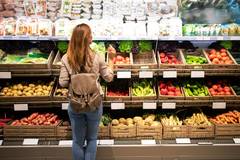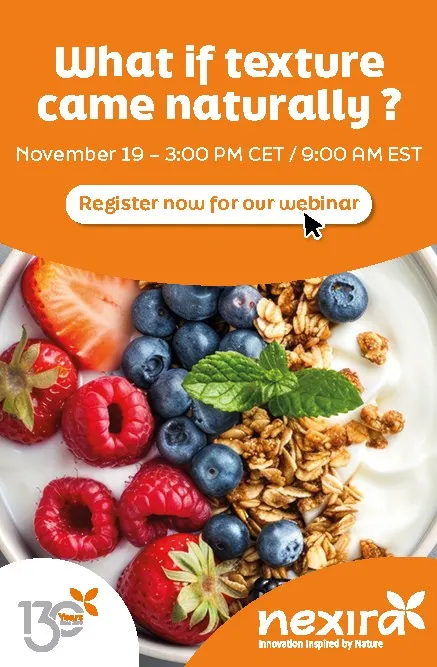Transparency triumphs at IFT First 2025: Ingredion, Comet Bio & FoodChain ID
Global consumers are increasingly influenced by environmental and social factors when deciding between food and beverage products. At the IFT First 2025 trade show in Chicago, US, last week, supply chain transparency took center stage as exhibitors presented solutions for more responsible ingredient sourcing and holistic sustainability choices.
The demand for greater transparency in the US F&B industry is driven by regulatory requirements, tech advancements, and growing consumer preferences for safer, healthier, and ethical food within a globalized food system.
According to Innova Market Insights’ research into clean label trends, almost 2 in 3 global consumers trust environmental claims on food packaging but seek greater transparency. Ethical-environment claims show the fastest growth, with a 15% CAGR over the past five years.
However, as Ingredion’s VP for Corporate Sustainability, Brian Nash, told Food Ingredients First on the show floor, sustainability-related decisions are complicated and often require trade-offs. The company takes a transparent, data-driven approach with its customers, helping them achieve their preferred balance of sustainability outcomes.

“We’ve always tried to be upfront and transparent with our customers about the challenges we’re facing in implementing sustainability. A decade ago, there wasn’t a lot of appetite from our company to talk publicly about where we failed, but the more we talked about what’s not working, the more we found opportunities to collaborate with our customers. They like that level of transparency — they don’t expect perfection, but they do want to know what’s going on so they can help be part of the solution,” said Nash. Brian Nash, VP for Corporate Sustainability at Ingredion.
Brian Nash, VP for Corporate Sustainability at Ingredion.
Ingredion and HowGood
Ingredion has partnered with HowGood, the world’s largest product sustainability database, since 2022. HowGood focuses on eight different sustainability attributes, helping Ingredion understand the wide-ranging impacts of changing ingredients or sourcing locations.
“HowGood helps us better understand formulating for sustainability and the trade-offs,” explained Nash.
“For example, a customer wanted low-carbon footprint stevia. I said, ‘The lowest carbon footprint and highest yield stevia comes from the Xinjiang province (China), which has some human rights allegations of forced labor.’ The customer said, ‘No, no, no, we don’t want it from there.’ And I said, ‘So what you want is the lowest carbon footprint, ethically sourced stevia?’ And they said, ‘Yes.’ That’s a perfect example of the trade-offs in sustainability.”
The breadth and scope of Ingredion’s sustainability-related activities have grown with the increasing consumer and customer demand for more responsible solutions.
“The biggest challenge is that there’s too much noise and we’re seeing the cost of sustainability going up. It’s important that a company has a North Star and a sustainability strategy that’s integrated with the business strategy, so we can decide what spaces we will play in,” said Nash. Loula Merkel, CEO at Comet Bio.
Loula Merkel, CEO at Comet Bio.
Comet’s upcycled prebiotic fiber
Comet Bio presented Arrabina, a fully soluble, upcycled wheat-derived prebiotic fiber for improved gut microbiome diversity and stability at IFT First 2025. CEO Loula Merkel highlighted Arrabina’s clean label credentials, low-carbon footprint, and US FDA-recognized prebiotic certification.
“Sustainability is at the core of our process and company,” she told us. “First of all, we use crop leftovers as our starting material. About two-thirds of the wheat crop is just thrown away, so we partner with farmers after the grain is harvested to collect the leaves and stalks of the wheat plant. There’s no grain or gluten in any of our raw material, and we process that with just water and pressure — it’s a very clean process. We extract the gluten-free wheat fiber extract.”
The Arrabina fiber is upcycled-certified, but the company went a step further in driving transparency for its customers by hiring Plant FWD to evaluate its lifecycle GHG footprint. “Plant FWD found that from among all the fibers they evaluated, we had the lowest carbon footprint,” said Merkel.
Comet Bio also requested that the decarbonization platform evaluate the impact of swapping an ingredient, like its fiber, versus changing the product packaging.
“Company sustainability goals often focus on packaging, but if you’re, for example, a nutrition bar producer, the outer package is a small component of the total product, whereas the ingredients themselves are basically the whole product. We found that you can have a much higher impact adopting our fiber in a nutrition bar rather than investing in a more sustainable packaging option.” Wes Frierson, VP of Digital Solutions at FoodChain ID.
Wes Frierson, VP of Digital Solutions at FoodChain ID.
FoodChain ID’s AI tool
Across the show floor, FoodChain ID discussed the use of AI in the food industry, particularly in recipe development and sodium reduction. The certification and compliance firm helps food companies improve the integrity, safety, and efficiency of their operations while providing transparency to consumers and regulators.
FoodChain ID’s current capabilities allow for specific guidance on product adjustments, but future advancements will enable AI to evaluate and suggest changes across thousands of products. The technology combines foundational models with proprietary techniques and data, optimizing for food-specific use cases.
It also addresses manufacturing inefficiencies by providing plant-specific advice, improving yield, and reducing waste. The platform is designed to be accessible to all food companies, from start-ups to large corporations, democratizing AI technology in the industry.
Wes Frierson, VP of Digital Solutions at FoodChain ID, told Food Ingredients First the company’s embedded AI product development tool delivers real-time guidance and intelligence to enable faster, safer, and more consistent decision making in formulation and compliance.
















